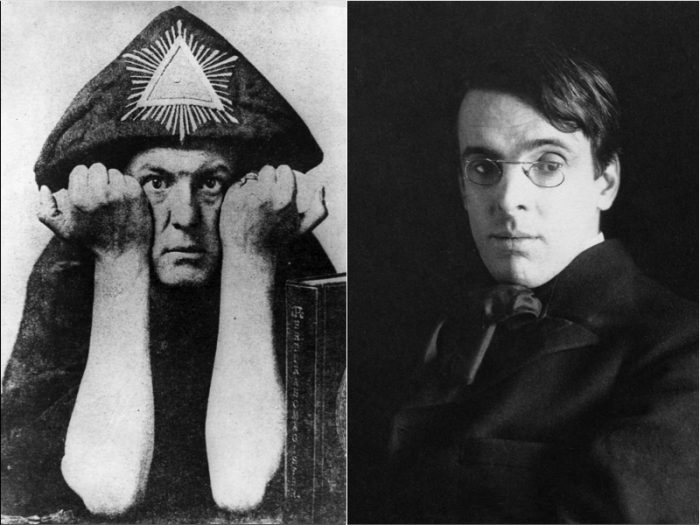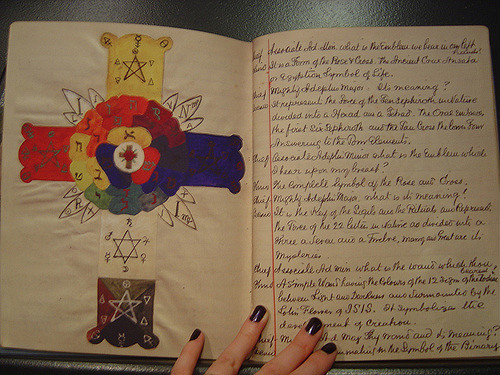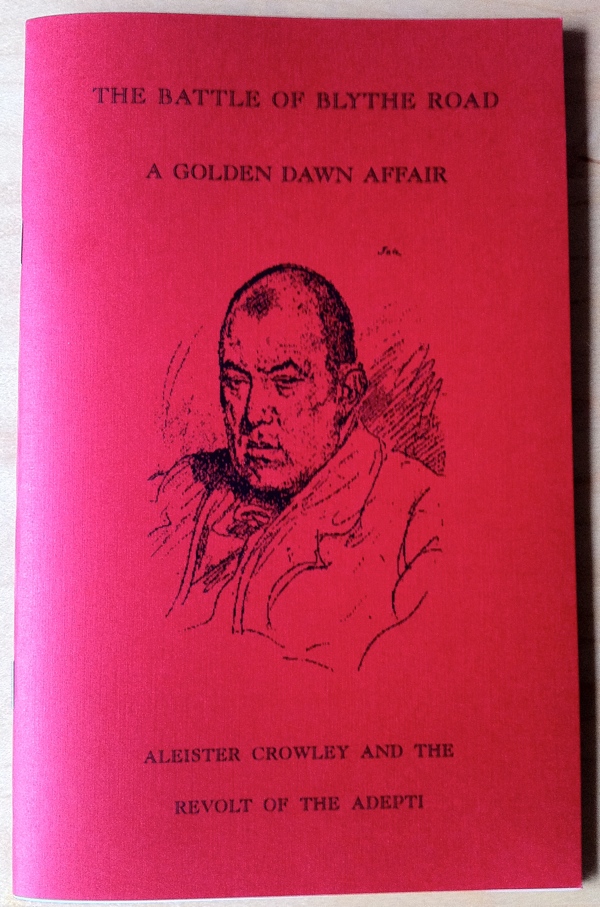
Aleister Crowley—English magician and founder of the religion of Thelema—has been admired as a powerful theorist and practitioner of what he called “Magick,” and reviled as a spoiled, abusive buffoon. Falling somewhere between those two camps, we find the opinion of Crowley’s bitter rival, the Irish poet William Butler Yeats, who once passionately wrote that the study of magic was “the most important pursuit of my life….. The mystical life is the center of all that I do and all that I think and all that I write.”
Crowley would surely say the same, but his magic was of a much darker, more obsessive variety, and his success as a poet insignificant next to Yeats. “Crowley was jealous,” argues the blog Rune Soup, “He was never able to speak the language of poetic symbol with the confidence of a native speaker in the way Yeats definitely could.” In a 1948 Partisan Review essay, literary critic and Yeats biographer Richard Ellmann tells the story differently, drily reporting on the conflict as its participants saw it—as a genuine war between competing forms of practical magic.
Having been ejected from the occult Theosophical society for his magical experiments, writes Jamie James at Lapham’s Quarterly, Yeats joined the Hermetic Order of the Golden Dawn, “an even more exotic cult, which claimed direct descent from the hermetic tradition of the Renaissance and into remote antiquity.” At various times, the order included writers Arthur Machen and Bram Stoker, Yeats’ beloved Irish revolutionary Maud Gonne, and famous magicians Arthur Edward Waite and Crowley. (Just below, see a page from Yeats’ Golden Dawn journal. See several more here.)

“When Crowley showed a tendency to use his occult powers for evil rather than for good,” Ellmann writes, “the adepts of the order, Yeats among them, decided not to allow him to be initiated into the inner circle; they feared that he would profane the mysteries and unleash powerful magic forces against humanity.” Crowley’s ouster lead to a confrontation in 1900 that might make you think—depending on your frame of reference—of the warring magicians on South Park or of Susanna Clark’s Jonathan Strange & Mr. Norrell, or both. “Crowley refused to accept their decision,” writes Ullmann, and after some astral attacks on Yeats,
.… in Highlander’s tartan, with a black Crusader’s cross on his breast… Crowley arrived at the Golden Dawn temple in London. Making the sign of the pentacle inverted and shouting menaces at the adepts, Crowley climbed the stairs. But Yeats and two other white magicians came resolutely forward to meet him, ready to protect the holy place at any cost. When Crowley came within range the forces of good struck out with their feet and kicked him downstairs.
This almost slapstick vanquishing became known as “the Battle of Blythe Road” and has been immortalized in a publication of that very name, with accounts from Crowley, Yeats, and Golden Dawn adepts William Westcott, Florence Farr and others. But the war was not won, Ellmann notes, and Crowley went looking for converts—or victims—in London, while Yeats attempted to stop him with “the requisite spells and exorcisms.” One such spell supposedly sent a vampire that “bit and tore at his flesh” as it lay beside Crowley all night. Despite Yeats’ supernatural interventions, one of Crowley’s targets, a young painter named Althea Gyles, was “finally forced to give way entirely to his baleful fascination.”

Ellmann’s both humorous and unsettling narrative shows us Crowley-as-predator, a characterization the wealthy Englishman had apparently earned, as “responsible governments excluded him from one country after another lest he bring to bear upon their inhabitants his hostile psychic ray.” [Brenda Maddox at The Guardian gives a slightly different account of the Battle, in which “Yeats, with a bouncer, saw him off the premises, called in the police and ended up (victorious) in court.” ] Yeats and the other members’ distaste for Crowley surely had something to do with his predatory behavior. But the rivalry was also indeed a poetic one, albeit extremely one-sided.
As Crowley biographer Lawrence Sutin writes, “the earnestness of the young Crowley could not compensate, in Yeats’ mind, for the technical difficulties and rhetorical excesses of his verse.” Yeats’ opinion “infuriated Crowley,” who indulged in the magic of projection, writing “What hurt him [Yeats] was the knowledge of his own incomparable inferiority.” Crowley’s remarks are both “ridiculous,” Sutin comments, and apply “far more convincingly to Crowley himself.” Nevertheless, Crowley’s “Magick,” continued to make Yeats uneasy, and he may have invoked Crowley in his famous line about the “rough beast” slouching toward Bethlehem in 1919’s “The Second Coming.”
While the magical battle between them might provoke more laughter than curiosity about their different brands of magic, Sutin notes a crucial difference that distinguishes the two men: “whereas Crowley placed himself in the services of the Antichrist ‘the savage God’ of the new cycle, Yeats’s fidelity was to ‘the old king,’ to ‘that unfashionable gyre.’” The gyre, so central an image in “The Second Coming,” stands for Yeats’ theory of time and history, and it belongs to an old mysticism and folklore that for him were synonymous with poetry.
Crowley viewed the occult as a source of personal power—his revelations filled books devoted to explaining the philosophy of Thelema (“Do what thou wilt shall be the whole of the Law. Love is the law, love under will); ” Yeats was certainly more of an “organization man… in his occult activities,” writes Maddox, and sought to practice magic as a holistic activity, fully integrated into his social, political, and aesthetic life. His “public philosophy,” as he called it, writes James, “propounds an extraordinarily convoluted system that aims to integrate the human personality with the cosmos.”
To understand Crowley’s magical thinking, we can probably skip his poetry and attempt as best we can to the decipher his several arcane, technical books full of invented terms and symbols. To understand Yeats, as much as that’s possible, we need to read his poetry, the purest expression of his mystical system and symbolic thought.
Related Content:
Rare 1930s Audio: W.B. Yeats Reads Four of His Poems
W.B. Yeats’ Poem “When You Are Old” Adapted into a Japanese Manga Comic
Josh Jones is a writer and musician based in Durham, NC. Follow him at @jdmagness


Thanks for posting this. This “magical quarrel” is the reason why I did my Master’s on Yeats and his “Vision.”
While on a research trip to London this summer, I spent two weeks in Crowley’s archives, and was thrilled to read his diary pertaining to this episode, as well as the Flying Rolls by Farr, and Letters from Yeats to AE and Lady Gregory boasting of victory. Crowley, too, claimed victory (of course). Despite his humiliation and arrest, the order did fall to chaos and eventually disintegrate. So, who had the last laugh? Fascinating stuff!
Hi Nix.
I’d love to read your research if it is available. My exact area of interest.
Cheers
Patrick.
Crowley’s ego aside, his legacy of Thelema, the OTO and his magickal system are anything but evil. Did the author even read any of his works?
This is one of the most uninformed pieces on Crowley that I have ever read, and I have read many. Bram Stoker was never a member of the Golden Dawn, Crowley did not consider himself a black magician: both Yeats and him knew that the distinction was a petty one. And actually, to understand Crowley, his literature, including his poetry, is fundamental.
Inverted pentacle? Never in a million years… the article takes tiny bits of history and tries to make them into a joke.. any of these men what’s 1000 times better than the author of this piece of trash
The writer appears to have fallen into the trap of believing Crowley too much. Yeats was only dimly aware of Crowley who was was a low grade. He was blocked from entry to the Portal grade because a Gay club, which Crowley was a member, had just been raided and further scandals were expected as police investigated the membership list. Yeats later said “the Second Order is not a reform school.” The the Battle of Blythe Road account is pretty wide of the mark too. Crowley tricked the landlord into letting them in and changed the locks. Yeats showed up with a local cop… Crowley had no wish to be arrested because that would cause him problems so he agreed to leave. There was no court case over the matter. As sources the newspapers are very unreliable in reporting anything to do with Crowley or the Golden Dawn. You might like to look at “King over the Water” by er me
‘King Over The Water’ by Mr. F (above) is highly recommended.
I am going to go check out ‘King Over the Water’ by Mr. F. right now. I am writing a novel but the research is fascinating and helpful. I live near where Crowley once spent 4 months in “paradise” and prefer facts to inspire my fiction. :)
So which was it? A nifty battle or just a please-leave-ok- thing?
Thank you-
Kerry
Mr. Nick Farrell has written several books on related subjects and should absolutely be taken a look at on Amazon.com. King Over the Water looks really interesting. I am following you on Amazon now and look forward to reading your work.
Kerry
my name is Kelly, and as crazy as it might sound I do believe that aleister Crowley is my great grandfather. I don’t know very much about his works but I’m trying to get a better insight on it to really try to understand why my life has been so messed up and why people have always been attacking me with magic and pretty much just trying to keep me from finding all this out. I was taken away from my mother whenever I was like 14 years old and she pretty much disappeared and her whereabouts are unknown til this day :( my mother’s maiden name was/is Susan Mary Crowley… All I know is that I went to Catholic School growing up and I believe in God and I know for a fact that when u have a pure heart and good intentions and all that you do, God wasn’t lying when he said the enemy will not prosper over you. I know that much because all my life people have been like attacking me I mean this s*** is sick the things that have been done to me I feel purposely like it’s so crazy I don’t know what kind of cult all this has behind it or that’s really what I’m trying to find out. When I was a little girl my grandpa’s sister her name was Anne with an e.… She was the most terrible lady I ever met she used to make me cry and she was just an awful awful lady and that’s the only reason why I remember her that and because my middle name is Anne but with no e my mom says that she named me after her aunt her my mom’s side and not my grandpa’s terrible sister. I’ve come to realize that it says that my grandpa’s mother’s name was Helen, in reality my mom had an aunt named Helen. I believe that there’s some sort of cover-up or something and I just don’t understand why these people all my life like been keeping tabs on me and persecuting me for some s*** I don’t even know anything about. I’m like all light and love, I’ve never been into any kind of perverse sexual things or wanted to harm anybody. I’ve always had this feeling like that I would be really strong if I started practicing magic, and I’ve always like avoided that at all cost and not even experimented with it but I don’t know I guess I’m just trying to make sense of things I can’t post a picture but if you saw me I have aleister Crowley exact eyes. All my life I’ve known that there was more to my life or something or something behind this that was being hidden from me. I’m sure people will think oh that I’m crazy just want attention or something that I’m not the type I’m actually really shy and have really bad anxiety. I really don’t want any attention from it but I really would like to find out more about this man’s life or like what it was that he practiced or try to get some kind of insight on it. I believe there’s some serious secret society work involved in this that may or may not have influenced my life a lot or basically like ruined my life pretty much trying to keep this all secret or something. I don’t even know who to go to to inquire about what I would need to do to like get proof of this because it’s scary there’s already all these people kind of like after me over this and I swear that people have been sent to try to kill me even so it’s like kind of scary to even bring up or say to anybody I have no idea what’s all involved or how deep it could go but you guys seem to know about this man if you can like send me some insights or something that you feel is the truth about his works or something it would really help me a lot so that I can try to put sense to this in the meantime I’m going to try to get a lawyer and see what I would need to do to find out for sure if we have the same DNA or whatever but just curious and trying to find some answers, and I’m posting this because I never know what’s going to happen when I do try to find out the truth and I just wanted it to be posted somewhere online so people can know about me if in the bad event that something bad happens to me when I follow through with my inquiry regarding my relation to this man if any… All I know is that I’m not crazy, definitely not trying to be famous or get any kind of attention like that I’m just curious for my own personal knowledge of it and trying to make sense of my life and journey here on this Earth. God is light and love and light and love reigns supreme here, evil is no match for it don’t ever believe otherwise. God bless me in my journey to seek the truth, and may it be brought to light. God bless all of you and anyone reading this message. Thx for your help :) Amen